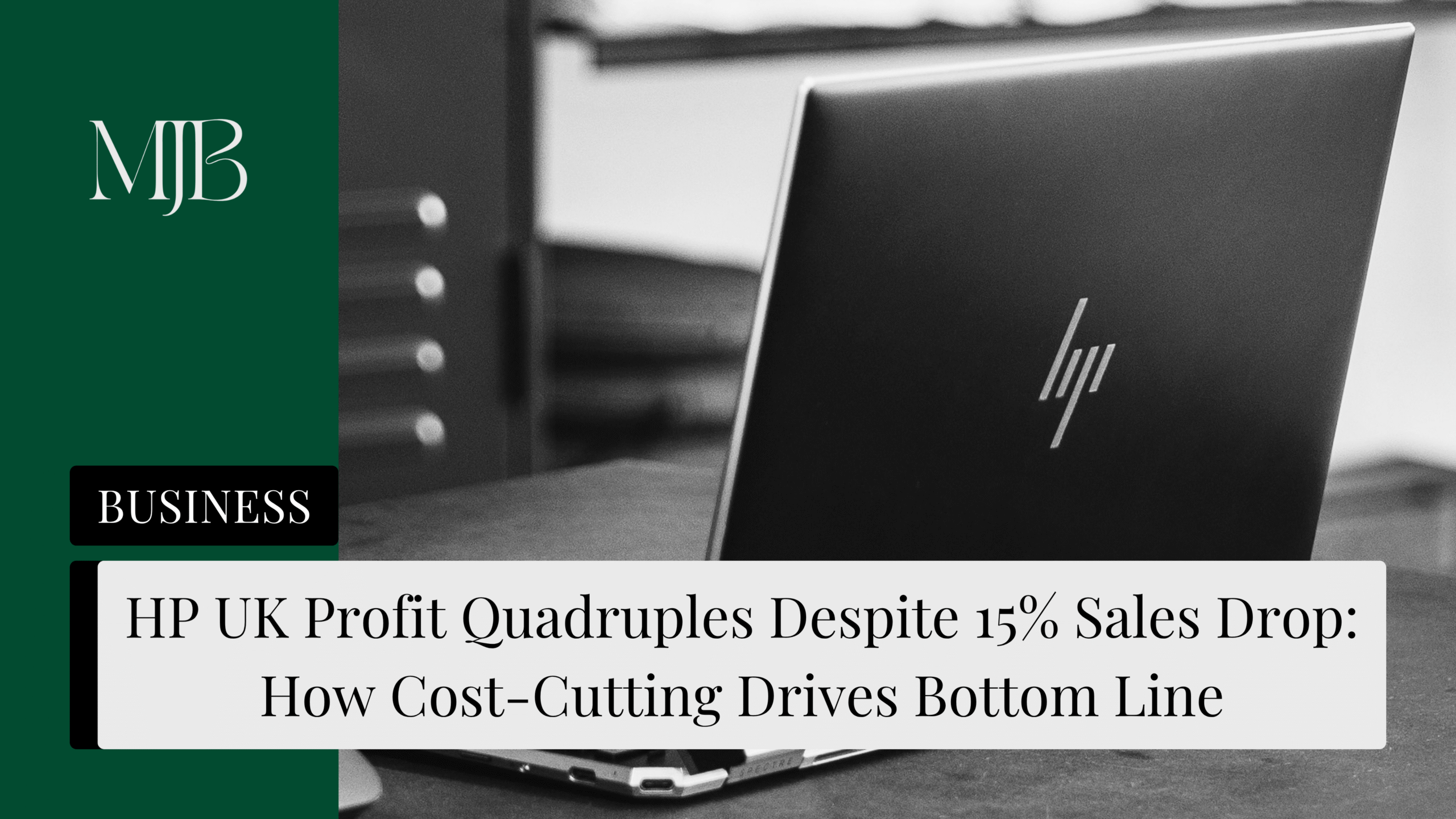Ever wondered how a company can lose £143m in sales but still see profits soar? HP’s UK division just pulled off this financial magic trick, posting a nearly 4x profit jump whilst revenues tanked 15%.
The tech giant’s British arm reported £97.6m in pre-tax profit for 2024 – up from just £26.6m the year before. Meanwhile, sales dropped from £948.2m to £805.2m. It’s a masterclass in operational efficiency that every CFO should study.
Here’s how HP turned falling sales into rising profits, plus what it means for the broader tech sector recovery.
The Numbers Behind HP’s Profit Surge
HP’s UK financials tell two very different stories. Revenue fell hard – down £143m year-over-year as “softened demand” hit the tech sector. But profits? They absolutely exploded.
Operating profit jumped from £2m to £61m, whilst pre-tax profit hit £97.6m. That’s not just growth – that’s a complete transformation of the business model.
The secret sauce? Aggressive cost management and smart financial engineering. HP slashed restructuring expenses and reduced expected credit loss provisions against inter-company balances. Translation: they cleaned house and got their financial forecasting right.
Cost-Cutting Strategy Pays Off Big
HP didn’t just sit around waiting for demand to recover. They launched what they call “cost reduction programs” designed for long-term benefit.
The company’s board emphasised balancing short-term pain with long-term gains: “This profitability allows the company to reinvest in new and emerging business opportunities and is highly correlated to generating cash.”
Smart move. Whilst competitors might panic over falling sales, HP used the downturn to optimise operations. They’ve essentially built a leaner machine that can generate serious cash flow even when market conditions suck.
Mike Lynch Legal Saga Finally Ends
The infamous Autonomy acquisition disaster… It just got closure – with a £700m price tag.
Mike Lynch’s estate was ordered to pay Hewlett Packard Enterprise just under £700m, ending the fraud case linked to HP’s disastrous £8.5bn Autonomy purchase in 2011. Lynch, who died in a yacht accident in Sicily last August, had been battling HP in court for over a decade.
HP originally sued for £3.7bn, claiming Lynch and CFO Sushovan Hussain artificially inflated Autonomy’s revenues. Whilst Lynch was acquitted of criminal charges in the US, the civil case has now concluded in HP’s favour.
What This Means for Tech Sector Recovery
HP’s results offer a roadmap for tech companies navigating tough markets. When demand drops, operational excellence becomes everything.
The company’s ability to maintain profitability whilst sales fell 15% shows how effective cost management can insulate businesses from market volatility. For investors, it’s a reminder that revenue isn’t everything – profit margins matter more.
HP says they’re launching “certain initiatives” to drive future revenue growth. With their newly streamlined operations, they’re positioned to capture upside when tech demand rebounds.
Key Takeaways
HP UK turned a sales slump into a profit bonanza through disciplined cost management and operational efficiency. Whilst £143m in lost revenue stings, nearly quadrupling profits to £97.6m proves that smart execution beats market timing.
Ready to dive deeper into tech sector trends? Check out our latest analysis on how companies are navigating the current market downturn.
FAQ
Q1: How did HP increase profits while sales fell?
A: HP aggressively cut costs, reduced restructuring expenses, and improved financial forecasting. They essentially built a more efficient operation that generates higher margins even with lower revenue.
Q2: What was the Autonomy case about?
A: HP sued Mike Lynch and Sushovan Hussain for allegedly inflating Autonomy’s financials before HP’s £8.5bn acquisition in 2011. Lynch’s estate was just ordered to pay £700m in damages.
Q3: Is HP’s UK performance sustainable?
A: The profit surge came largely from one-time cost reductions and financial adjustments. Sustainability depends on whether HP can grow revenue while maintaining these improved margins.
Q4: What does this mean for HP investors?
A: It shows HP can maintain profitability even in tough markets. The focus on operational efficiency and cost management suggests management is preparing for long-term success, not just short-term gains.
Q5: How does this compare to other tech companies?
A: HP’s ability to increase profits while sales fell 15% outperforms many tech peers struggling with demand softness. It demonstrates the power of proactive cost management during market downturns.
DISCLAIMER
Effective Date: 15th July 2025
The information provided on this website is for informational and educational purposes only and reflects the personal opinions of the author(s). It is not intended as financial, investment, tax, or legal advice.
We are not certified financial advisers. None of the content on this website constitutes a recommendation to buy, sell, or hold any financial product, asset, or service. You should not rely on any information provided here to make financial decisions.
We strongly recommend that you:
- Conduct your own research and due diligence
- Consult with a qualified financial adviser or professional before making any investment or financial decisions
While we strive to ensure that all information is accurate and up to date, we make no guarantees about the completeness, reliability, or suitability of any content on this site.
By using this website, you acknowledge and agree that we are not responsible for any financial loss, damage, or decisions made based on the content presented.






